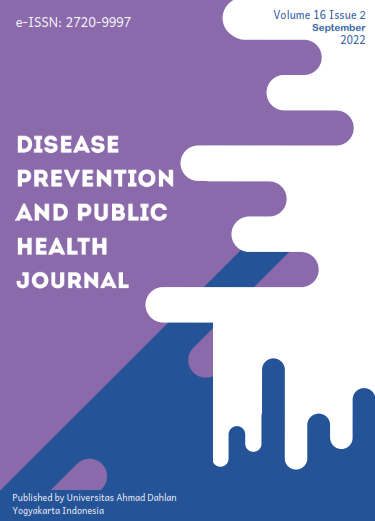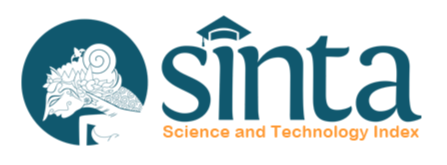Prevalence and Risk Factors of Soil-transmitted Helminth Infections in Cattle Breeders in Mlaten Village, East Java
DOI:
https://doi.org/10.12928/dpphj.v16i2.4941Keywords:
intestinal nematode infection, factor risk, Soil-Transmitted HelminthsAbstract
Background: Soil-transmitted helminth infections are diseases caused by the ingestion of infective stages (in the form of eggs, larvae, cysticercoid, and plerocercoid) of worms (nematodes, cestodes, and trematodes) into the human gastrointestinal tract through the fecal-oral route. The risk factors associated with soil-transmitted helminth infections are environmental factors and hygiene factors. These factors are commonly found in agricultural areas. Therefore, we conducted research in Mlaten Village because the majority of the villagers work as cattle breeders. In addition, the surrounding community, especially cattle breeders, experienced excessive diarrhea that was probably caused by a lack of hygiene knowledge, poor sanitation, and low awareness of cattle care and management. This study aims to determine the prevalence and risk factors of soil-transmitted helminth infections in cattle farmers in Mlaten village, Mojokerto, East Java. Methods: This research was conducted using a survey method and cross-sectional study design with 30 cattle farmers as respondents. Human and cow feces were identified using a staining method in the form of 2% eosin. We also used questionnaires to determine the risk factors. The data obtained were presented descriptively and risk factors were analyzed using the chi-square test. Results: The results showed that the habit of cutting nails (OR= 0.083; CI 95%= 0.007-0.950; p<0.05), the habit of washing hands (OR= 0.000; CI 95%= 0.000-0.000; p<0.05), and the habit of washing hands with soap (OR= 0.040; CI 95%= 0.267-18.925; p<0.05) have a significant effect on the incidence of soil-transmitted helminth infections. Conclusion: The prevalence of soil-transmitted helminth infections is significant to personal hygiene risk factors.
References
Mekonnen Z, Hassen D, Debalke S, Tiruneh A, Asres Y, Chelkeba L, Zemene E, Belachew T. Soil-Transmitted Helminth Infections and Nutritional Status of School Children in Government Elementary Schools in Jimma Town, Southwestern Ethiopia. SAGE Open Med. 2020 Sep 4;8:2050312120954696. doi: 10.1177/2050312120954696. PMID: 32953118; PMCID: PMC7475784.
Sumbele IUN, Nkain AJ, Ning TR, Anchang-Kimbi JK, Kimbi HK. Influence of Malaria, Soil-Transmitted Helminths and Malnutrition on Haemoglobin Level Among School-Aged Children in Muyuka, Southwest Cameroon: A Cross-sectional Study on Outcomes. PLoS One. 2020 Mar 30;15(3):e0230882. doi: 10.1371/journal.pone.0230882. PMID: 32226023; PMCID: PMC7105131.
Djuardi Y, Lazarus G, Stefanie D, Fahmida U, Ariawan I, Supali T. Soil-transmitted Helminth Infection, Anemia, and Malnutrition Among Preschool-Age Children in Nangapanda Subdistrict, Indonesia. PLoS Negl Trop Dis. 2021 Jun 17;15(6):e0009506. doi: 10.1371/journal.pntd.0009506. PMID: 34138863; PMCID: PMC8253427.
Belizario V Jr, Delos Trinos JPCR, Sison O, Miranda E, Molina V, Cuayzon A, Isiderio ME, Delgado R. High Burden of Soil-Transmitted Helminth Infections, Schistosomiasis, Undernutrition, and Poor Sanitation in Two Typhoon Haiyan-Stricken Provinces in Eastern Philippines. Pathog Glob Health. 2021 Sep;115(6):412-422. doi: 10.1080/20477724.2021.1920777. Epub 2021 May 6. PMID: 33956588; PMCID: PMC8592586.
Ramos F, Marques CB, Reginato CZ, Bräunig P, Osmari V, Fernandes F, Sangioni LA, Vogel FSF. Field and Molecular Evaluation of Anthelmintic Resistance of Nematode Populations from Cattle and Sheep Naturally Infected Pastured on Mixed Grazing areas at Rio Grande do Sul, Brazil. Acta Parasitol. 2020 Mar;65(1):118-127. doi: 10.2478/s11686-019-00137-6. Epub 2019 Nov 13. PMID: 31721057.
Prajnya Paramitha R, Ernawati R, Koesdarto S. The Prevalence of Gastrointestinal Tract Helminthiasis Through Stool Examination in Cattle at Benowo Landfill Surabaya. J Parasite Sci. 2019;1(1):23. http://dx.doi.org/10.20473/jops.v1i1.16218
May K, Brügemann K, König S, Strube C. Patent infections with Fasciola hepatica and Paramphistomes (Calicophoron Daubneyi) in Dairy Cows and Association of Fasciolosis with Individual Milk Production and Fertility Parameters. Vet Parasitol [Internet]. 2019;267:32–41. doi: https://doi.org/10.1016/j.vetpar.2019.01.012
Kouam MK, Fokom GT, Luogbou DD'N, Kantzoura V. Gastro-intestinal Parasitism and Control Practices in Dairy Cattle in North-west Cameroon (Central Africa). Acta Parasitol. 2021 Sep;66(3):947-953. doi: 10.1007/s11686-021-00343-1. Epub 2021 Mar 15. PMID: 33721185.
Paller VGV, Babia-Abion S. Soil-transmitted Helminth (STH) Eggs Contaminating Soils in Selected Organic and Conventional Farms in the Philippines. Parasite Epidemiol Control. 2019 Aug 15;7:e00119. doi: 10.1016/j.parepi.2019.e00119. Erratum in: Parasite Epidemiol Control. 2020 Dec 15;11:e00194. PMID: 31872089; PMCID: PMC6911896.
Lynn MK, Morrissey JA, Conserve DF. Soil-Transmitted Helminths in the USA: a Review of Five Common Parasites and Future Directions for Avenues of Enhanced Epidemiologic Inquiry. Curr Trop Med Rep. 2021 Jan 30:1-11. doi: 10.1007/s40475-020-00221-2. Epub ahead of print. PMID: 33552843; PMCID: PMC7847297.
Squire SA, Robertson ID, Yang R, Ayi I, Ryan U. Prevalence and risk factors associated with gastrointestinal parasites in ruminant livestock in the Coastal Savannah zone of Ghana. Acta Trop [Internet]. 2019;199:105126. Available from: https://www.sciencedirect.com/science/article/pii/S0001706X19302220
Opara KN, Wilson EU, Yaro CA, Alkazmi L, Udoidung NI, Chikezie FM, Bassey BE, Batiha GE. Prevalence, Risk Factors, and Coinfection of Urogenital Schistosomiasis and Soil-Transmitted Helminthiasis among Primary School Children in Biase, Southern Nigeria. J Parasitol Res. 2021 Mar 13;2021:6618394. doi: 10.1155/2021/6618394. PMID: 33791124; PMCID: PMC7984897.
Ahiadorme M, Morhe E. Soil Transmitted Helminth Infections in Ghana: A Ten Year Review. Pan Afr Med J. 2020 Apr 20;35:131. doi: 10.11604/pamj.2020.35.131.21069. PMID: 32655745; PMCID: PMC7335259.
Sugiyama H, Morishima Y, Kagawa C, Araki J, Iwaki T, Ikuno H, Miguchi Y, Komatsu N, Kawakami Y, Asakura H. Current Incidence and Contamination Sources of Ascariasis in Japan. Shokuhin Eiseigaku Zasshi. 2020;61(4):103-108. doi: 10.3358/shokueishi.61.103. PMID: 33012763.
Mogaji HO, Dedeke GA, Bada BS, Bankole S, Adeniji A, Fagbenro MT, Omitola OO, Oluwole AS, Odoemene NS, Abe EM, Mafiana CF, Ekpo UF. Distribution of Ascariasis, Trichuriasis and Hookworm Infections in Ogun State, Southwestern Nigeria. PLoS One. 2020 Jun 8;15(6):e0233423. doi: 10.1371/journal.pone.0233423. PMID: 32511237; PMCID: PMC7279584.
Kurscheid J, Laksono B, Park MJ, Clements ACA, Sadler R, McCarthy JS, Nery SV, Soares-Magalhaes R, Halton K, Hadisaputro S, Richardson A, Indjein L, Wangdi K, Stewart DE, Gray DJ. Epidemiology of Soil-Transmitted Helminth Infections in Semarang, Central Java, Indonesia. PLoS Negl Trop Dis. 2020 Dec 28;14(12):e0008907. doi: 10.1371/journal.pntd.0008907. PMID: 33370267; PMCID: PMC7793285.
Ramaswamy G, Sathiyasekeran M. Chronic Watery Diarrhea in a Toddler: Think Beyond Toddler's Diarrhea. Indian J Pediatr. 2021 Jun;88(6):604. doi: 10.1007/s12098-021-03735-3. Epub 2021 Mar 23. PMID: 33754310.
Agustina, Dukabain OM, Singga S, Wanti W, Suluh DG, Mado FG. Home Sanitation Facilities and Prevalence of Diarrhea for Children in Oelnasi Village, Kupang Tengah Sub-district. Gac Sanit. 2021;35 Suppl 2:S393-S395. doi: 10.1016/j.gaceta.2021.10.059. PMID: 34929859.
Hailegebriel T, Nibret E, Munshea A. Prevalence of Soil-Transmitted Helminth Infection Among School-Aged Children of Ethiopia: A Systematic Review and Meta-Analysis. Infect Dis (Auckl). 2020 Oct 5;13:1178633720962812. doi: 10.1177/1178633720962812. PMID: 33088182; PMCID: PMC7543112.
Zuroida R, Azizah R. Sanitasi Kandang dan Keluhan Kesehatan Pada Peternak Sapi Perah di Desa Murukan Kabupaten Jombang. J Kesehat Lingkung. 2018;10(4):434. https://e-journal.unair.ac.id/JKL/article/viewFile/5116/5795
Cha YE, Fu YZ, Yao W. Knowledge, Practice of Personal Hygiene, School Sanitation, and Risk Factors of Contracting Diarrhea among Rural Students from Five Western Provinces in China. Int J Environ Res Public Health. 2021 Sep 9;18(18):9505. doi: 10.3390/ijerph18189505. PMID: 34574432; PMCID: PMC8468795.
Amuzie CC, Moslen M, Clement A. Low Prevalence of Helminths in Faecal Samples of Cattle and Goats from Trans-Amadi Abattoir (Slaughterhouse), Port Harcourt, Nigeria. SF J Env Earth Sci 2018; 1. 2018;1012. doi: https://dx.doi.org/10.14202%2Fvetworld.2020.338-344
Karshima SN, Maikai B-V, Kwaga JKP. Helminths of Veterinary And Zoonotic Importance in Nigerian Ruminants: A 46-Year Meta-Analysis (1970–2016) of Their Prevalence and Distribution. Infect Dis poverty. 2018;7(1):1–15. http://dx.doi.org/10.1186/s40249-018-0438-z
Pasaribu AP, Alam A, Sembiring K, Pasaribu S, Setiabudi D. Prevalence and Risk Factors of Soil-Transmitted Helminthiasis Among School Children Living in an Agricultural Area of North Sumatera, Indonesia. BMC Public Health. 2019 Aug 7;19(1):1066. doi: 10.1186/s12889-019-7397-6. PMID: 31391023; PMCID: PMC6686497.
Ohorella A, Endah N. The Effect of Personal Hygiene Enviromental Sanitation and Characteristics of Children With Worms Infection in Elementary Schools in Tulehu Village, Salahutu District, Central Maluku Regency. Int J Heal Educ Soc. 2020;3(8):44–55. doi: https://doi.org/10.1234/ijhes.v3i8.110
Laoraksawong P, Suntaraluk A, Kongnil W, Pongpanitanont P, Janwan P. Prevalence of Soil-Transmitted Helminth Infections and Associated Risk Factors among Schoolchildren in Nakhon Si Thammarat, Thailand. Iran J Parasitol. 2020 Jul-Sep;15(3):440-445. doi: 10.18502/ijpa.v15i3.4210. PMID: 33082810; PMCID: PMC7548470.
Wandra T, Darlan DM, Yulfi H, Purba IE, Sato MO, Budke CM, Ito A. Soil-transmitted helminth infections and taeniasis on Samosir Island, Indonesia. Acta Trop. 2020 Feb;202:105250. doi: 10.1016/j.actatropica.2019.105250. Epub 2019 Oct 31. PMID: 31678236.
Karshima SN. Prevalence and Distribution of Soil-Transmitted Helminth Infections In Nigerian Children: A Systematic Review And Meta-Analysis. Infect Dis Poverty. 2018 Jul 9;7(1):69. doi: 10.1186/s40249-018-0451-2. PMID: 29983115; PMCID: PMC6036687.
Baidowi II, Armiyanti Y, Febianti Z, Nurdian Y, Hermansyah B. The Correlation Between the Use of Personal Protective Equipment (PPE) and Soil-Transmitted Helminths Infection in the Workers of Kaliputih Plantation Jember Regency. J Agromedicine Med Sci. 2019;5(2):61–8. http://dx.doi.org/10.19184/ams.v5i2.9625
Asfaw MA, Wegayehu T, Gezmu T, Bekele A, Hailemariam Z, Gebre T. Determinants of Soil-Transmitted Helminth Infections Among Pre-School-Aged Children in Gamo Gofa Zone, Southern Ethiopia: A Case-control Study. PLoS One. 2020 Dec 11;15(12):e0243836. doi: 10.1371/journal.pone.0243836. PMID: 33306738; PMCID: PMC7732061.
Nisha M, Aiman M, Asyhira N, Syafiq H, Atiqah N, Kumarasamy V, Tan MP, Davamani F. Risk Factors Associated with Soil Transmitted Helminth (STH) Infection in Two Indigenous Communities in Malaysia. Trop Biomed. 2020 Jun 1;37(2):379-388. PMID: 33612807.
Novák M, Breznický J, Kompaníková J, Malinovská N, Hudečková H. Impact of Hand Hygiene Knowledge on the Hand Hygiene Compliance. Med Glas (Zenica). 2020 Feb 1;17(1):194-199. doi: 10.17392/1051-20. PMID: 31556581.
Downloads
Published
Issue
Section
License
Copyright (c) 2022 Universitas Ahmad Dahlan

This work is licensed under a Creative Commons Attribution-ShareAlike 4.0 International License.
Authors transfer the copyright and grant the Disease Prevention and Public Health Journal right of first publication with the work simultaneously licensed under a Creative Commons Attribution License (CC BY-SA 4.0) that allows others to share (copy and redistribute the material in any medium or format) and adapt (remix, transform, and build upon the material) the work for any purpose, even commercially with an acknowledgement of the work's authorship and initial publication in Disease Prevention and Public Health Journal. Authors are able to enter into separate, additional contractual arrangements for the non-exclusive distribution of the journal's published version of the work (e.g., post it to an institutional repository or publish it in a book), with an acknowledgement of its initial publication in Disease Prevention and Public Health Journal. Authors are permitted and encouraged to post their work online (e.g., in institutional repositories or on their website) prior to and during the submission process, as it can lead to productive exchanges, as well as earlier and greater citation of published work (See The Effect of Open Access).

This work is licensed under a Creative Commons Attribution-ShareAlike 4.0 International License.







